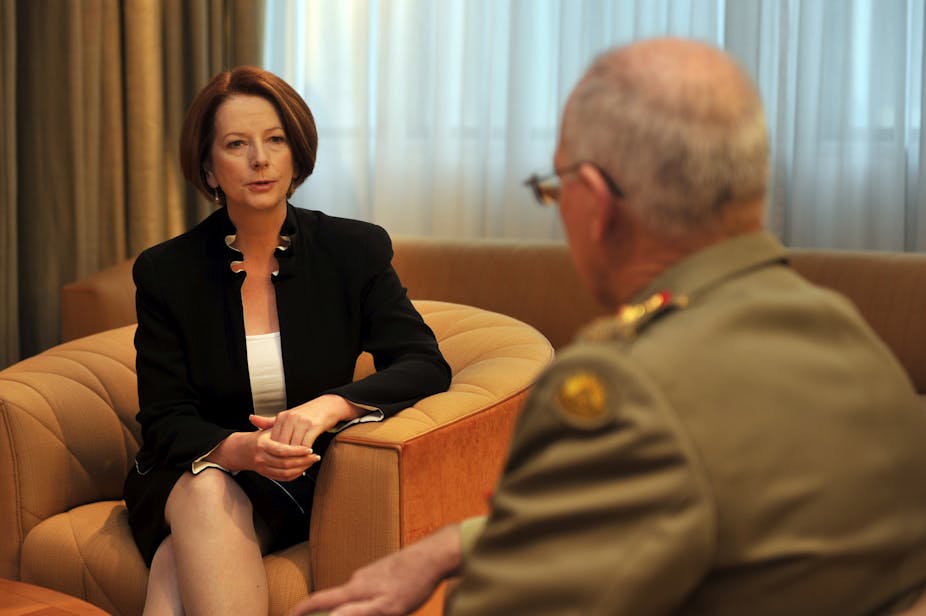Greeting the findings of the Houston expert panel on asylum seekers, The Australian front page exclaimed “At last, people put before politics”.
This is, of course, ridiculous. The Malaysian solution would not have been an issue had it not been plucked out of the air by Julia Gillard. The insistence on restoring Nauru to its previous role as a remote prison would not have survived, had Tony Abbott not refused to budge.
Finding a solution to the problem of maritime asylum seekers would not have been so difficult if the advantages of blowing the issue up into a major political story had not been attractive to the conservatives and so frightening to the Labor Party.
Whatever policies are adopted and whatever compromises are reached among Australian politicians, this dilemma will not disappear in the foreseeable future. In fact it may well become worse as the Muslim world continues to erupt politically.
The political calculus
Labor represents the great majority of Commonwealth and State electorates with large concentrations of immigrant populations. It might be assumed that these populations would be favourable towards refugees, who make up a significant number of their voters. But this is not necessarily the case.
Many of these populations contain Christian refugees who have fled Muslim regimes. Most of the electorates have large Catholic communities who might be hesitant about Muslim refugees in general. But even more important is that there are very few electorates in which immigrants form a majority - just four Commonwealth seats in western Sydney.
Their voters are drawn from many different backgrounds. This means that even in so-called “ethnic” areas, the largest bloc of voters are Anglo-Australians, who may not wish to see the addition of newcomers. This has been particularly relevant in Sydney where there is a major “ethnic boundary” west of Bankstown, Liverpool, Blacktown and Parramatta.

Politicians, such as immigration minister Chris Bowen, sit right at the edge of this major social divide.
For various reasons electorates in Western Sydney have been turning against their previous loyalty to Labor, often in quite large numbers. The influence of popular media and talkback radio is especially strong.
While a similar situation does not exist in Melbourne or Adelaide, it is this shift which has fuelled Labor’s willingness to take the harder line visible on asylum seekers. The reaction on the “ethnic frontier” (which replicates former reactions in the United States) has been little researched but has to be taken into account by ALP strategists.
In other parts of Australia such as Queensland or Western Australia, the “boat people” debate is influenced by older traditions such as the “opening of the floodgates” - a term used for over a century.
This provided a transitory basis for Pauline Hanson’s One Nation, which was strongest in those two states and had no following in Sydney or Melbourne. This is essentially a conservative constituency, unlikely to swing to Labor (notwithstanding the brief career of Kevin Rudd).
There is nothing politically to be gained by the Liberals in moving from their rigid stance. Even if they compromise on the “Malaysian solution” they have won most of the other issues.
The hope for Labor is to hang on to electorates they once regarded as safe. The hope for the Greens is that former Labor voters in inner city Melbourne and Sydney will sustain their currently unmoving 12% of the vote.
They, too, aren’t moving on offshore processing - in other words using the mandatory detention system to cull out asylum seekers before they reach Australian soil.
This opposition has its uses in the Senate with the courts as a last resort. But The Greens no longer have the appeal to Labor of allocating enough preferences to stay in office. On current evidence that will not work next time, especially in the Sydney marginals. As usually with political arguments the negatives outnumber the positives.
Re-aligning immigration policy
The expert panel has provided a well documented report, tackling what has become an intractable problem. Had the problem not been inflated by conflicting political interests it would not have become so intractable.
Most asylum seekers deserve protection from the oppressive governments and destructive political forces of their own country. Most are educated, young and valuable potential Australians.
The sad fact is that immigration is reaching record heights while humanitarian admissions have remained at the same level since the 1990s. Changing this is one of the most acceptable aims of the expert report.
But it can only be implemented if Australia acts to deal with the realities of its neighbourhood rather than with the local demands of its political parties.

